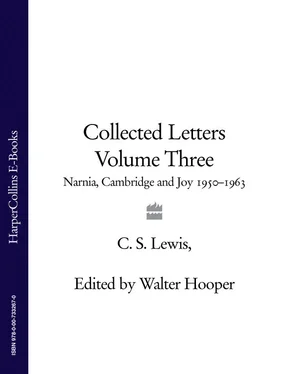Dear Green
Cd. you dine with me (7 p.m. smoking room) on Wed March 8th? I have several books to return and the typed MS of the Horn story 46 & MS of The Voyage of the Dawn Treader .
Yours
C. S. Lewis
Ever since June 1947 when Warnie, suffering from acute alcoholic poisoning, was hospitalized in Our Lady of Lourdes Hospital, Drogheda, County Louth (see CL II, p. 787), his binges had become more frequent. When the brothers were younger Warnie was gregarious and Jack something of a recluse. As time went on Jack’s fame as a Christian apologist drove him to mingle with all kinds of people; Warnie, on the other hand, withdrew more and more into the company of books and a few friends. Alcohol gave him back, temporarily, the old gregariousness that was draining away. He was a binge-drinker, and if Jack could get him into either the Acland Nursing Home, Banbury Road, or Restholme, a private nursing home at 230 Woodstock Road run by Dorothy Watson, the bout was fairly short-lived. If, however, he slipped past his brother and reached Ireland, he usually ended up in the hospital at Drogheda, and he might be away for as long as six months. Despite Warnie’s efforts to overcome the problem, Jack was not successful in persuading him to join Alcoholics Anonymous. As time went on Warnie’s binges were of longer duration, and Jack was left to cope as best he could .
TO JILL FLEWETT (T): 47
Magdalen College
Oxford
29/2/50
My dear June
W. is in a nursing home 48 at present—nothing serious, indeed he ought to be out now only the nurses have made such a domestic pet of him he can’t tear himself away—so I’ve been pretty busy letter writing. So sorry about yr. mother: please give her my duty.
Minto has at last allowed Bruce 49 to be euthanised. Don’t mention it if writing to her. She seems to miss him surprisingly little so there’s no good stirring the matter up. This has made an enormous difference to our lives–we feel like a balloon that has dropped half its ballast—the music room is clean! R.I.P. We’d both like to see you again. All the best.
Yours (in haste)
Jack
TO THE EDITOR OF THE TIMES LITERARY SUPPLEMENT? 50
Magdalen College,
Oxford.
Sir,—
It cannot often happen that a scholar, writing to expose the corruption of a text, should himself at that very moment suffer inadvertently a corruption of the same sort; but it really looks as if something like this had happened to Professor Dover Wilson in his edition of Two Gentlemen (Cambridge, 1921). 51 Here on page 103 (note on V iv 89-90) he rightly points out that which out of my neglect was never done 52 is a ‘line of verse’, and adds: ‘The adapter is caught—in the act.’ 53
But surely, on this principle, the evidence for an adapter in Professor Wilson’s own Notes is even stronger? Without turning a page we find:—
(1) On page 102.—‘Not free from “cuts”, is in the simple end-stopped verse which we associate with the youthful Shakespeare.’
(2) ibid .–‘This section is in quite another style.’
(3) ibid .–‘Strong medial pauses and—strange combinations!’ (The exclamation so obviously added for the metre, makes this example especially flagrant.)
(4) ibid .–‘In one of which we find a fossil line.’
(5) ibid .–‘Silence of Silvia, while events so vital’
(6) ibid .–‘Is virtually his own composition.’
(7) ibid .–‘The entry of the Duke and Thurio.’
(8) ibid .–‘May have been taken from a later portion.’
(9) ibid .–‘It may have been located in Verona.’ ‘We cannot tell. One of the minor problems.’
(10) ibid .–Page 103. ‘Clearly corrupt. Daniel proposed “discandied.”‘
(11) ibid .–‘The repetition in 1. 59.’
(12) ibid .–‘Through careless copying of the adapter.’
(13) ibid .–‘To mend the metre of these lines. The sense needs mending also.’ ‘73. short line.’ (Note here the omission of the article before short, clearly for the metre.)
C. S. Lewis
TO VERA MATHEWS (W): TS
RER50/81.
Magdalen College,
Oxford.
9th March 1950.
My dear Miss Mathews,
You will no doubt be wondering—not angrily I’m sure, but sympathetically—why your two excellent parcels have gone unacknowledged.
The fact is that my secretary-brother chose the most inconvenient time of the term to retire to his bed and has only just ‘come to the surface’ again. While he was away I found my self very rushed, and my correspondence suffered accordingly.
I have so often tried to tell you how grateful I am for all your kindness that I find myself reduced to a simple ‘thank you’: but if the words are stale, the sentiment which prompts them is as fresh as ever.
Here we are enjoying the dubious delights of early English spring, and I often wonder what visiting Americans make of it: for they are already arriving in surprisingly large numbers considering the time of year. I can only suppose that they all come from Northern Alaska, and find our climate a nice change! If you have any friends who think of coming over, tell them that the English summer generally falls in the third week in June.
With many thanks and all my best wishes,
yours sincerely,
C. S. Lewis
TO WARHELD M. FIROR(BOD): 54
Magdalen etc.
12/3/50
Dear Firor–
Well, term is over. And the election is over too, but you don’t want to hear about that: 55 except (which is the really remarkable thing) that despite the heavy poll I never knew an election pass with less apparent excitement. Perhaps this is because it was felt to be so important: it is not in the front line that War forms the incessant subject of conversation!
As for term, the last bit of it has been heavy for me with Scholarship Examinations. One answer is so puzzling that I wd. like to hand it on. Commenting on Hamlet’s words
Sure he that made us with such large discourse, Looking before and after, gave us not That capability and god-like reason To fust in us unus’d, 56
one boy explained the first line as meaning ‘He who made the creation of man seem important by talking about it.’ Since this youth, needless to say, has no chance of a scholarship and therefore will not be summoned for an interview, we shall all go to our graves without knowing what he meant. What, do you think, is the Theology implied? My own vein of Irreverence (still, I fear, inexhausted) cannot help building up a picture: the Almighty feeling (and is one surprised?–) that Homo Sapiens could hardly be reckoned among His chefs d’oeuvre, 57 and wondering if a publicity campaign could mend matters.
Not, of course, that all the young men we have to examine are like this. At the other end of the scale comes the candidate for a mathematical Fellowship who said–and was understood by the other mathematician who was examining him, but by no one else in the room—‘I assume that All Stars are Trivially Embedded.’ Can you do that one? ( Stars does not mean the things in the night sky, I’m told: nor even, which wd. make sense of another sort, film-stars).
But there is something about this endless examining, quite apart from the labour, which bothers me. It sets me wondering about the whole system under which you, as well as we, now live. Behind all these closely written sheets which I have to read every year, even behind the worst of them, lie hours of hard, long work. Even the bad candidates are doing their best and have been trained up to this ever since they went to school. And naturally enough: for in the Democracies now, as formerly in China under the mandarin system, success in competitive examinations is the only moyen de parvenir, 58 the road from elementary school to the better schools, and thence to college, and thence to the professions. (You still have a flourishing alternative route to desirable jobs through business which is largely disappearing with us: but it is at least equally competitive).
Читать дальше












